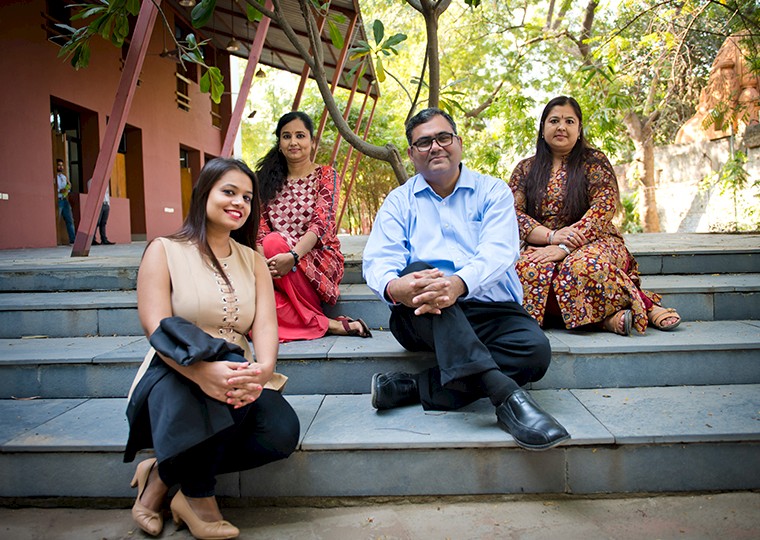Undergraduate Research Programme
The Undergraduate Research Programme (UGRP) encourages undergraduate students to experience the joy of research and what it means to be a researcher. Through the Undergraduate Research Programme the University provides opportunities to students to deeply explore issues or ideas by either working on them independently under the supervision of a faculty member or with faculty in their laboratory or on their research projects. This programme is a good preparation for graduate school and provides an exposure to a research-oriented career. It also provides an opportunity to work closely with a professor. Students should respond to announcements by faculty who may be looking for students for their research projects. Students are also encouraged to directly approach the faculty and express their desire to work with them on research projects.



Research projects offered will be shared by the Undergraduate College from time to time. Interested students should apply by responding by email to the faculty proposing the project. Before selection, the faculty may conduct an interview to discuss the project.
To learn more, contact the Undergraduate College at [email protected] for details regarding the programme.
The experience goes beyond academic credits’
Shagun Agrawal Narendra, Integrated MS with a Major in Life Sciences, School of Arts and Sciences, worked on the Undergraduate Research Programme (UGRP), Emotional Health and Wellbeing for student-led technology based interventions at Ahmedabad University, with Shilpa Pandit, Associate Professor, School of Arts and Sciences; Sonal Yadav, Assistant Professor, Amrut Mody School of Management; Bijal Mehta, Associate Professor, Amrut Mody School of Management; and Amit Nanavati, Professor, Amrut Mody School of Management.
The central idea of the project revolved around identifying the risks and the strengths of the learning experience at Ahmedabad University post the pandemic and to design and assess necessary interventions. Shagun says, “Our objective, firstly, was to understand the risk and the protective factors that students experience. Secondly, we wanted to get a fair assessment of the current strengths and support systems and how likely students are to use the support services provided to them by the University’s Wellness team or other sources online or offline. Finally, we also wanted to understand the factors that make students less likely to use the same support services.” Throughout the project, the team tried to analyse the limitations of the resources available to students, and how factors like stigma and cultural differences may hinder the students from seeking help.
Shagun explains how being part of the UGRP provides an opportunity to engage in real-world problem-solving and learn valuable skills that can be applied in future career pursuits. She says, “The experience goes beyond academic credits. It helps develop critical thinking, analytical, and communication skills that employers value highly. Additionally, working on a UGRP can offer a chance to build a professional network, gain mentorship from experienced researchers, and potentially lead to future career or academic opportunities. Participating in research is a highly rewarding experience, allowing students to make a meaningful contribution to their field of study while also enhancing their personal and intellectual growth.”

Shagun Agrawal Narendra
Integrated MS with a Major in Life Sciences,
School of Arts and Sciences
Vinisha Matlani, BA (Hons) with a Major in Psychology, Class of 2025, School of Arts and Sciences, worked on the Undergraduate Research Programme (UGRP), Emotional Health and Wellbeing for student-led technology based interventions at Ahmedabad University, with Shilpa Pandit, Associate Professor, School of Arts and Sciences; Sonal Yadav, Assistant Professor, Amrut Mody School of Management; Bijal Mehta, Associate Professor, Amrut Mody School of Management; and Amit Nanavati, Professor, Amrut Mody School of Management.
The project aimed to study the impact of social media platforms, like Instagram, that students use as a means to express themselves on the mental health of Ahmedabad students. They also identified potential areas of improvement for the University’s counselling centre too. Vinisha says, “As a psychology major, I am inclined towards observing the mental health of my peers. The UGRP gave me an opportunity to know more about what the pain points for my peers may be and how online counselling interventions offered by Ahmedabad University, like YourDost, can be optimised.” During the UGRP, she was trained in skills such as creating targeted and concise questionnaires and delivering them sensitively to protect the sentiments of participants. She shares, “I learnt how to map the emotions of the participants better; being students at the University helped us channelise our thoughts and more holistically understand challenges that participants faced.”

Vinisha Matlani
BA (Hons) with a Major in Psychology
School of Arts and Sciences
Class of 2025